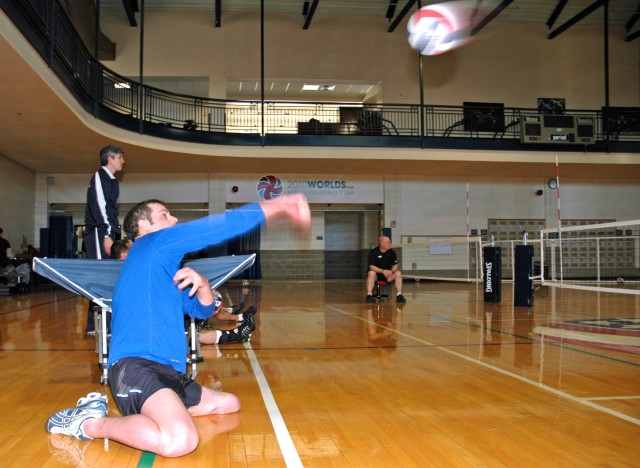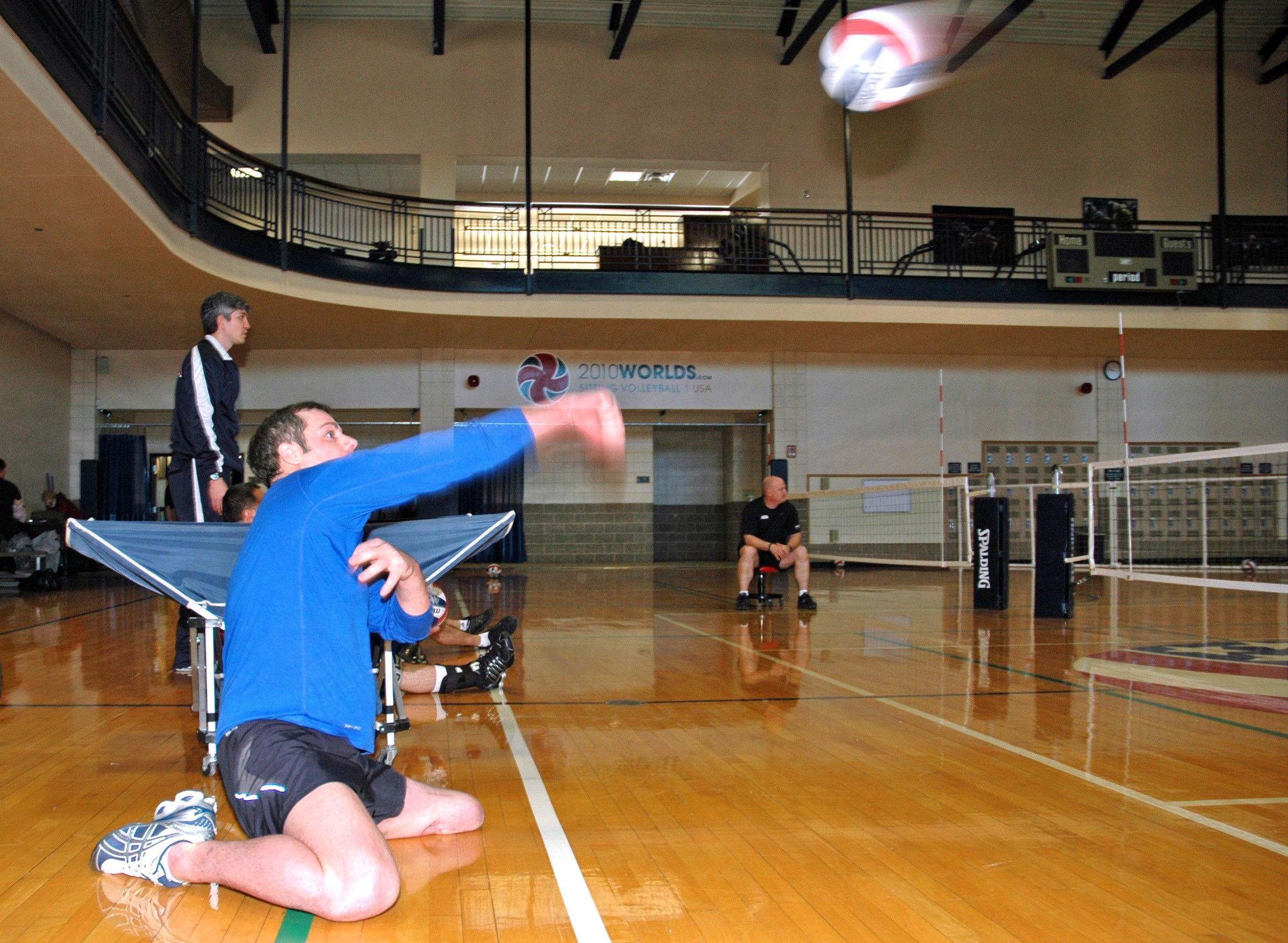
EDMOND, Okla. (Army News Service, Jan. 12, 2011) -- Thirty wounded warriors from as far as Europe and Hawaii descended last week on this small bedroom community north of Oklahoma City to hone their sitting volleyball skills.
The Soldiers came to improve their skills, techniques, and workout regime with the ultimate goal of winning gold in sitting volleyball competition during the 2011 Warrior Games this May in Colorado Springs, Colo.
Service members included military police, engineers and truck drivers -- to name but a few. Additionally, three Army Wounded Warrior Program veterans rounded out the impressive group of competitive athletes.
Helping them train were coaches, mentors, managers, non-medical attendants and physical and orthopedic therapists. The big guns were provided by coaches and players from USA Volleyball and the University of Central Oklahoma.
During the 2010 Warrior Games, the Army had to settle for silver in sitting volleyball, when defeated by the Marines in the finals. That defeat doesn't sit well with Sgt. Cayle Foidel, of Fort Lewis, Wash.
"I won three gold medals at the games, but didn't compete in sitting volleyball at the 2010 Warrior Games; however, several Soldiers attending this week's training camp did," Foidel said. "We all feel we need to get better and are committed to doing so. We've trained hard this week and I've used muscles I didn't even know I had. My butt really hurts!"
The second-annual Warrior Games, scheduled May 16-21 at the Olympic Training Center in Colorado Springs, Colo., will feature 200 wounded, ill and injured servicemembers from all branches of the U.S. armed forces.
Competitors in the events compete in several sports, including shooting, swimming, archery, track and field, cycling, sitting volleyball and wheelchair basketball.
"The Warrior Transition Command is working closely with our UCO partners to coach, train and select the Army's 2011 Warrior Games team," said Master Sgt. James Shiver, the WTC noncommissioned officer in charge of adaptive sports. "We're really excited to have the opportunity to team with UCO and the U.S. Olympic and Paralympics committees to prepare our athletes for competition against the Marines, Navy and Air Force teams."
Elliott Blake, UCO sitting volleyball cCoordinator, was responsible for the training regime, schedule and further developing the athletes into cohesive team players. Blake established some strict ground rules prior to the clinic and demanded that the athletes work hard and heed instructions outlined by the training team.
"We're going to work you hard and we don't want excuses. We won't tolerate tardiness, and following instructions is key to your success at this week's clinic," said Blake. "The more disciplined athletes that follow our instructions will learn and progress and ultimately improve their chances of making the Army team."
During orientation, Blake informed the athletes -- many who had never played sitting volleyball -- that they would be getting a workout unlike any they've had before.
"Your butt will be sore, your arms will be tired and you'll likely sweat a lot," he said. He encouraged each to bring extra t-shirts to practice and to continue to hydrate. "Some of our U.S. Paralympic athletes go through four shirts per practice session."
The three-day clinic included two intense training days with sitting volleyball coaches, trainers and players, followed by a round-robin format tournament on Sunday. Throughout the event, talent was evaluated by coaches and trainers.
"The sitting volleyball clinic is pretty short, but I am learning a lot of new skills here and it's great to get this opportunity to train with the Paralympic coaches and players," said Spc. Robert Nuss, with the Fort Benning, Ga., Warrior Transition Unit. "I went to Warrior Games last year and placed second in the Chairman's' Cup and I am very excited about the opportunity to go back in 2011."
Although Spc. Damion Peyton, with the Fort Gordon, Ga., WTU, didn't make the team in 2010, he agrees with Nuss about the clinic.
"Practice has been a bit much, the training has been very extreme, but the clinic is a great method to determine the best Soldiers for the team," Peyton said.
Peyton vowed to train even harder than he did last year when he practiced for wheelchair basketball and cycling. In 2011 he is adding sitting volleyball to his training regime.
Another newcomer to Warrior Games training and sitting volleyball is AW2 veteran Margaux Vair, who played lots of sports throughout high school and joined the military to compete on the Army's Women's Soccer team.
"I played traditional volleyball in high school in Colorado, but sitting volleyball is really different," she said. "It's all upper body work and I've got blisters on my thumbs, my hands are sore and my butt really hurts. It looks easy as folks slide around on the floor, but it really is deceptive on how hard you're working out there."
Shiver, who coordinated the sitting volleyball clinic for the Army and set up last month's wheelchair basketball clinic and an upcoming shooting clinic with the Army Marksmanship School at Fort Benning, Ga., believes all the training will pay off.
"We're really committed to helping develop athlete skills at these specialized sports clinics," he said. "Working with professionals, with USOC, UCO and Fort Benning, allows us to maximize these outstanding resources for the benefit of our wounded-warrior athletes."
Shiver went on to say that while the goal is for the Army to win at the Warrior Games, and there is a commitment to train and field the best team possible, there are other reasons wounded Soldiers should participate or try to compete.
"I want all 10,000 Soldiers in our WTUs involved in sport and recreation," he said. "If you get people involved in sport, it will spill over and get other people motivated in pursuing education, rehabilitation and other areas."
Following Sunday's tournament, USO's Blake was pleased with the efforts of the Army athletes. He saw vast improvements in how the players came together. They were playing more as a team.
"You've made outstanding progress over the past 72 hours," said Blake. "I saw your skills develop, but honestly, I wasn't convinced you were making progress as far as playing as a team instead of as a group of individuals. Today you proved to me that your progress in setting, spiking and overall team-play fundamentals has developed immensely."
Shiver encouraged all wounded-warrior athletes that want to compete in Warrior Games 2011 to contact their chain of command and submit a nomination packet. Nominations are due no later than Feb. 1. Packets will be evaluated by WTC and the Army team will be announced on Feb. 15.

Social Sharing